When you’re about to sit down to a delicious cheese platter, and your dog looks at you with those big puppy eyes, it’s tempting to share your tasty treat.
Many of us love to share with our dogs, whether it’s food, love, or new experiences. But as much as we would like to share everything, some things require us to dig a little deeper.
Cheese is an easy go-to treat that many owners reach for, but is it healthy for dogs? Is just any cheese ok? We’re going to get to the bottom of this and answer your cheesiest questions.
Key Takeaways: Can Dogs Eat Cheese?
- Many cheeses are safe for dogs to eat. You don’t want to give your dog too much cheese, but you can share some types of cheese with your canine.
- Some of the best cheeses to share with your pet include mozzarella, cottage cheese, and cheddar. By contrast, soft cheese like brie and blue cheeses are not safe for dogs.
- While some cheeses are safe for dogs, you don’t want to give your pup too much. Cheese is full of fat and calories, which can lead to weight gain. Plus, many dogs are lactose intolerant.
Can Dogs Eat Cheese?

The short answer is yes, most (not all) cheese is a safe and delicious treat for dogs. Just like humans, many dogs drool over the delightful flavors and textures cheese has to offer.
But cheese comes in many different types. Some are healthier than others, and some are best to avoid completely (more on that below).
Here are some things to consider before giving your dog a cheesy treat:
- Cheese has a lot of calories. When a dog consumes a lot of calories over a long period of time, it can cause digestive issues, weight gain, and even depression.
- Most cheeses are high in fat. A fatty diet may cause obesity and can lead to pancreatitis – a painful and potentially deadly condition in which the pancreas becomes inflamed.
- Cheese is often high in sodium. Foods that are too high in sodium can draw water out of the bloodstream and into the intestines, which may cause vomiting and dehydration.
- Some cheeses contain harmful ingredients. Some cheeses contain herbs and other ingredients, like raisins, chives, and onions, that may not be safe for dogs to eat.
- Cheese can cause or exacerbate certain health conditions. Dogs with certain health conditions like food sensitivities or lactose intolerance, shouldn’t be given cheese.
Check out some other great foods you can share with your dog!
Is Cheese Good for Dogs?

Cheese, in moderation, can be good for your dog since It contains several nutrients she needs to maintain optimal health. You can dole it out as a treat or just mix it in with your dog’s food.
These beneficial nutrients include:
- Calcium
- Protein
- Vitamin A
- B-complex vitamins
- Essential fatty acids
Cheese can also be used as positive reinforcement to encourage good behavior and habits. Since cheese is a treat that’s hard to resist, it can be a powerful motivator during training sessions. If your dog is easily distracted, cheese could be the solution you’re looking for.
Cheese can also help get your dog to take his medicine. Many dogs hate taking pills, but if you put it in a small cube of cheese, you can take something they do their best to avoid and turn it into a delightful treat.
Which Cheeses are Best for Dogs?
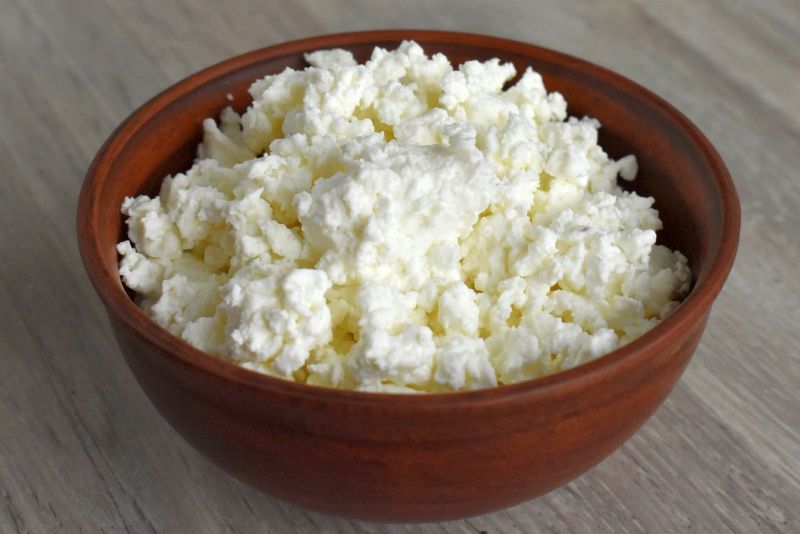
The best types of cheese you can give your dog are ones that are low in fat, low in sodium, and contain vitamins and minerals.
A few of the best types include:

Cheddar
A popular choice for both humans and dogs, cheddar cheese is a good source of protein, which is essential for building and repairing muscle.
It’s also high in calcium, which promotes strong teeth and bones.
Mozzarella
Low-moisture mozzarella is a decent source of calcium and protein, like most types of cheese, but it also has a milder flavor that some dogs might find more palatable.
Cottage cheese
Cottage cheese is a creamy treat that’s lower in fat and sodium than most cheeses.
Cottage cheese also contains less lactose, so it may be easier for dogs with lactose intolerance to digest (it’ll be less likely to make your dog gassy).
Swiss
Swiss cheeses provide protein and essential minerals such as calcium and phosphorus, which help dogs maintain bone health and produce energy.
Are Any Cheeses Dangerous for Dogs?
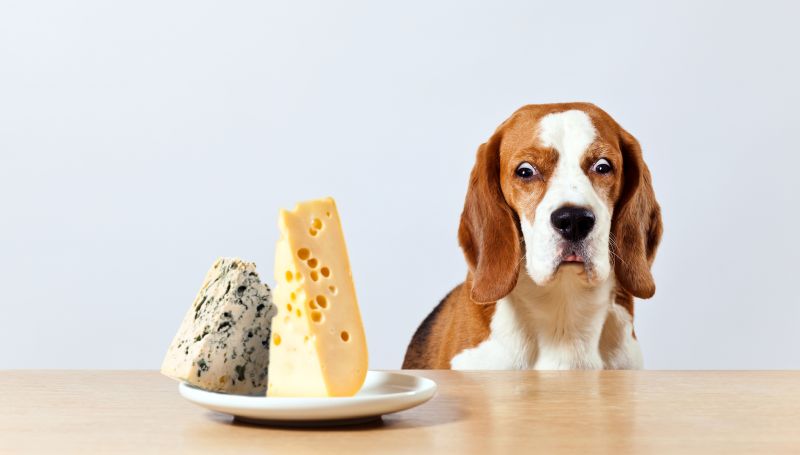
Yes, some cheeses could be dangerous for your dog to eat. Certain types of cheese are especially high in fat or sodium, or may contain toxins that aren’t safe for dogs to consume.
Brie, Goat, and Feta
These cheeses are too high in fat and sodium, making them unsafe to give to your pup.
Softer cheeses, like brie and goat cheese, also have a high moisture content, which may promote the growth of fungi that are unsafe for dogs to eat.
Blue Cheeses
The blue vein-like lines in blue cheese come from a type of mold called Penicillium roquefortii. It produces a mycotoxin called roquefortine C, which can cause stomach upset, vomiting, diarrhea, fever, and seizures in dogs.
At high doses, it’s a neurotoxin, so it’s best to keep dogs at a distance.
Check out some of the other foods that are toxic to dogs!
How Much Cheese Can I Give My Dog?
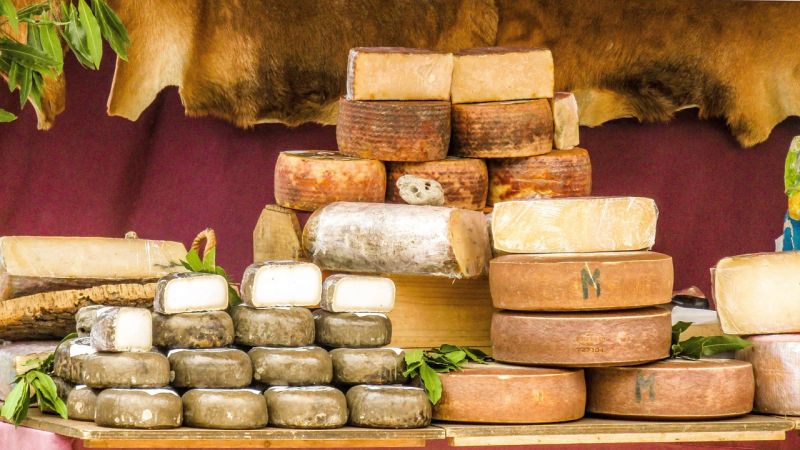
The safe amount of cheese varies depending on the size of your dog; larger dogs can safely eat more than smaller dogs.
But dogs generally shouldn’t eat more than a few small bites in a day.
Humans and dogs have different needs in terms of energy. For a dog, eating a 1-ounce piece of cheese (roughly the size of a pair of dice) is like a human eating one-and-a-half hamburgers.
Do Any Dog Foods Contain Cheese?

Yes, there are a few types of dog food that contain cheese. Some popular brands that list cheese as an ingredient include:
- Blue Buffalo
- Fromm
- The Honest Kitchen
There are also a few brands that market treats with cheese, such as Wellness.
Another Cheesy Option: Himalayan Yak Chews
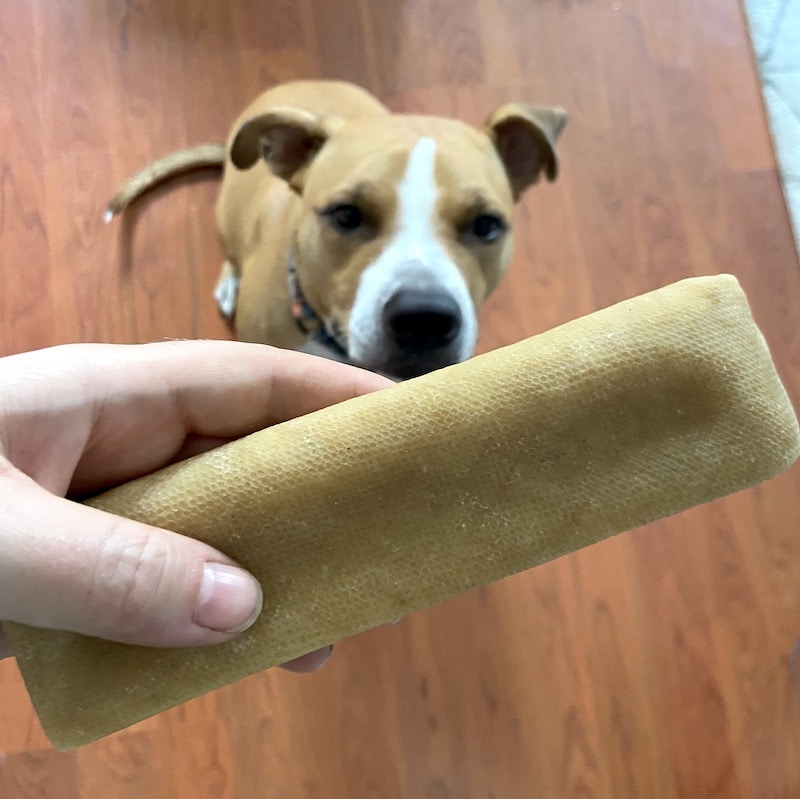
Himalayan yak chews are dog treats made from cow and yak’s milk that is naturally hardened and preserved.
They’re protein-rich, low-fat, and low in sodium. These tasty treats are fully digestible, contain no dyes or preservatives, and are virtually lactose-free. They’re pretty hard too, so they function great at long-lasting dog chews that can keep heavy chewers occupied as they enjoy the cheesy flavor.
While your dog chews, these treats may help remove some plaque from her teeth and clean hard to reach areas of her mouth. This can lead to fresher breath and better overall oral hygiene.
Best Cheese for Dogs: FAQ
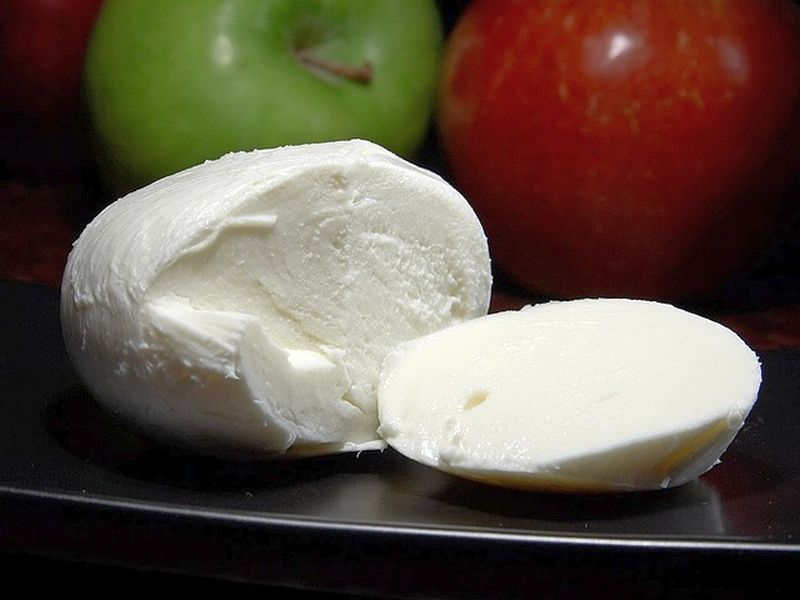
Still have questions about cheese for dogs? We are here to help! We’ve fetched some of the most common questions dog owners have about cheese and answered them below!
Is cheese safe for dogs?
Yes, cheese can be safe for healthy dogs to eat in moderation. Some types of cheese are high in fat and sodium, or may contain added ingredients or mold that can be harmful to dogs.
Stick to cheeses like mozzarella, cheddar, cottage cheese, and swiss cheese, and avoid blue-veined cheeses. If your pup is lactose intolerant, steer clear of mozzarella, cottage cheese, and other high-lactose cheeses, and dogs who have had pancreatitis should avoid cheese altogether.
Can you use cheese to train dogs?
Yes. Cheese can be great to use as a dog training treat. The delicious smell and taste make it hard for dogs to resist. Just be mindful of portion control. Cheese is high in calories and should be given in small pieces to avoid overfeeding and weight gain.
Which cheese do dogs like best?
Dogs have individual tastes, and one dog’s favorite cheese may not be another’s. The only way to find out what types your dog likes is to experiment a little. Start with a low-moisture mozzarella because its mild flavor may appeal to most dogs.
Can you add cheese to dog food?
You can add a small amount of cheese to dog food, as long as it doesn’t throw your dog’s diet off balance. When in doubt, ask your vet.
Low-fat, low-sodium cheese can be a lovely treat and a powerful motivator, but be mindful of how much is too much and how it’s affecting your dog’s health.
Have you had success using cheese as a reward during training? What’s your dog’s favorite type of cheese?
Let us know in the comments below!


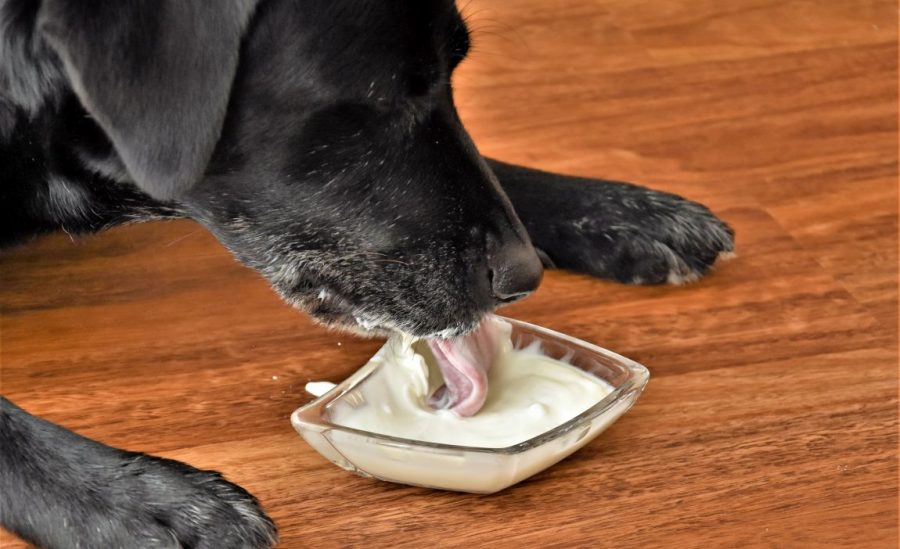



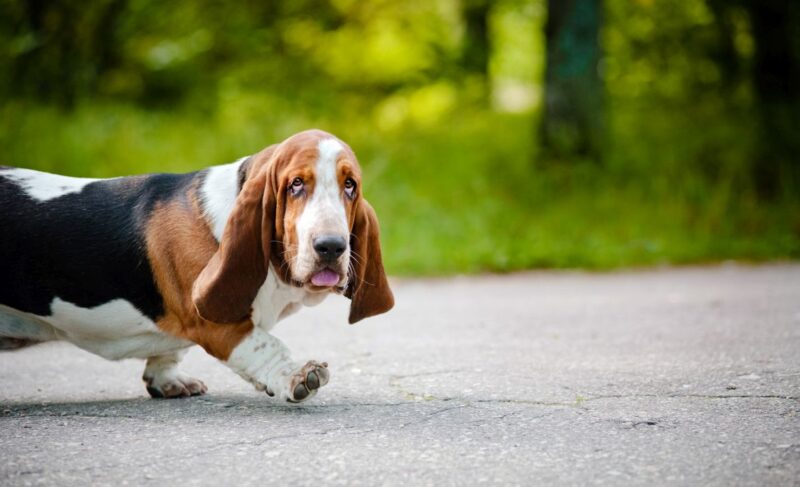
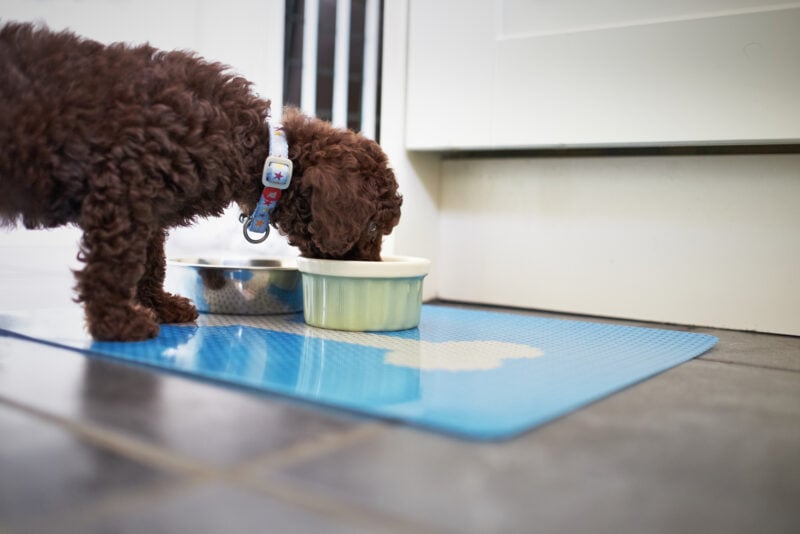


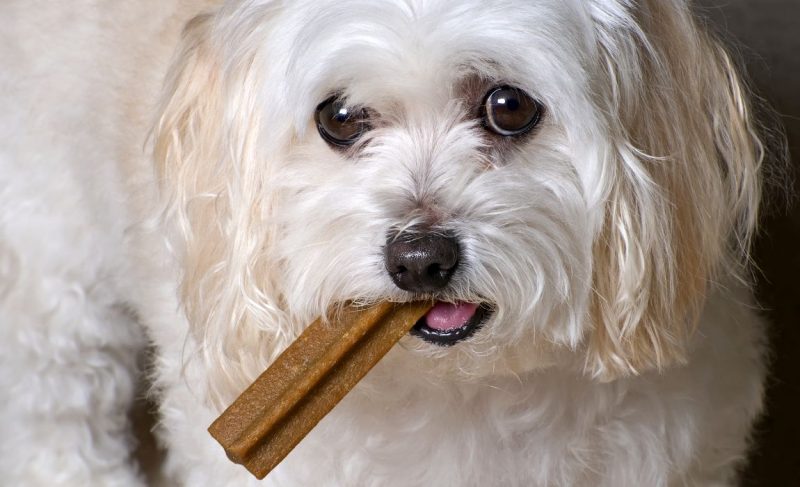
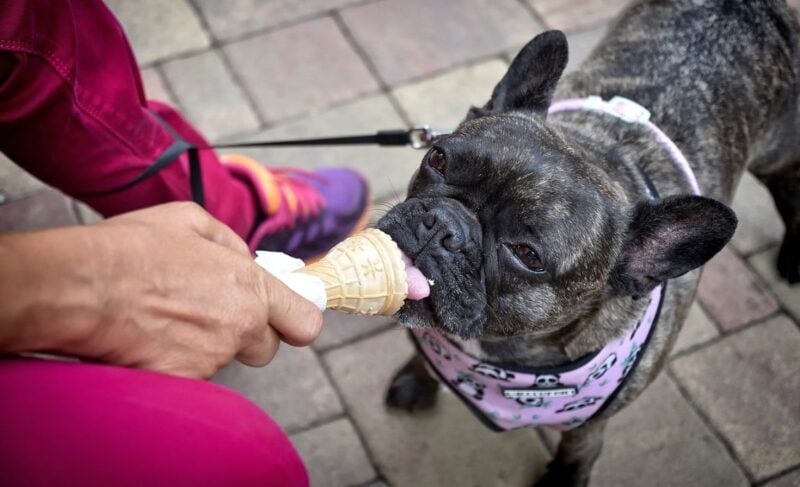

Leave a Comment